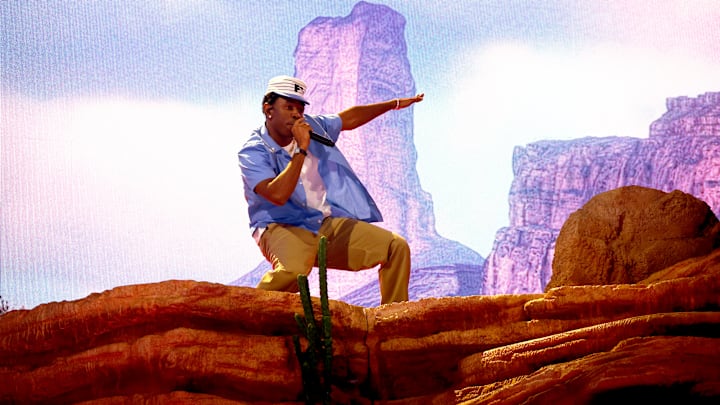On the heels of his No. 1 album DON'T TAP THE GLASS (2025), the catalog of Tyler, The Creator is ripe for reevaluation. While ...GLASS does not quite exist on the same plane as the eight albums before it, the fingerprints of its stylistic switches are present with deep listening.
Beginning with the surprise MTV2-driven popularity of the single "Yonkers" in 2011, Tyler continues to release albums that challenge and dazzle his growing faction. Always an artist looking to find his orbit, the studio albums demonstrate a willingness to push production beyond his last album.
Not necessarily an artist looking to make one central statement, Tyler's records chart his growth into a rhymer/producer/writer/collaborator. More importantly, his move from early Horrorcore-style to a more soulful hip-hop blend with Jazz, Funk, and R&B textures follow his journey as the more recent releases bring in the dimensions of his life.
Tyler, The Creator albums from worst to best
8. Cherry Bomb (2015)
Tyler's only misstep. The instrumentals prove that he is willing to change direction (the gorgeous "Find Your Wings" featuring Roy Ayers). For the first time, Tyler's lyricism feels false, and the overflow of guests leads to its sprawl. "DEATHCAMP" is a fantastic opener, "2SEATER" twists you around to arrive at Tyler at his most straightforward, and "Smuckers" brings in Lil Wayne and Kanye West for righteous anger.
7. Wolf (2013)
While Tyler declares that he "is the cowboy of his own dreams," Wolf shocks for comfort ("Domo 23") while seeking depth in communication as Tyler employs different voices. "Answer" advances his familial issues, although anger dissolves into hope. "Slater" boasts a major lyrical hook that Tyler takes for himself before turning it over to Frank Ocean for a double-tracked vocal zenith.
6. Goblin (2011)
After an independent album, Bastard (2009), and one uniting the Odd Future crew, Goblin (2011) sees Tyler taking over the controls. With his Horrorcore backdrops, Tyler reframes the dating world as a "Nightmare" and captures young adult nihilism in the inflamed declarations of "Radicals." As a producer, Tyler thinks minimally (the synth madness of "AU79") and maximally (the loopy "Fish").
However, his best rhythmic work shows on the menacing "Tron Cat" and the loping 8-bit Spaghetti Western "Sandwitches." Goblin's best writing and performance can be found in the horror/romance of "She," where Tyler's anger at himself and his lover takes some dark turns.
5. Flower Boy (2017)
Next-level Tyler emerges from the rainbow-vision organization of Flower Boy (2017). The only familiar aspect is Tyler's voice and beat programming ("November" spins jagged stop/start rhymes around its spartan beat).
Perennial favorites (Frank Ocean on the strutting "Where This Flower Blooms") and new additions (A$AP Rocky on the rumbling "Who Dat Boy" and Estelle on the dreamy "Garden Shed") offer a pattern match for Tyler and his now airtight production.
4. Chromakopia (2024)
A rapping tour-de-force for Tyler, Chromakopia is made to feel like it is slipping into and out of gear. These rhymes and beats are more stripped down than ever. As a result, the Soul and Jazz accents carom off of the songs and lend cohesion. However, content-wise, tracks like "Judge Judy" and "Darling, I (feat. Teezo Touchdown)" feel a little light and too close to previous recording styles and themes.
Chromakopia has two brilliant moments in the dark "Noid" and the explosive stomping "Sticky (feat. GloRilla, Sexyy Red & Lil Wayne)." To quote "Take The Mask Off," "I hope you find yourself."
3. DON'T TAP THE GLASS (2025)
Inspired by 1980s Electro Rap and Nineties New Jack R&B, Tyler creates a dense and danceable mix that absorbs his many influences (Eric B. & Rakim, N.W.A., UGK, Roger & Zapp, Jodeci, and more). GLASS hits like a cruise missile. Tyler either places himself where he has to either compete with his song/sound fusion ("Big Poe" with Pharrell) or rap around the rhythm and deliver the hook ("Sucka Free").
2. Igor (2019)
"Exactly what you run from, you end up chasing," Jerrod Carmichael intones as Tyler's narrator on the love triangle/breakup tale Igor (2019). On his most unified production, Tyler carves out a danceable yet experimental album of hip-hop whose beats throb like you are nursing heartbreak. The moral of the story is that no matter how destroyed you feel, you have to give in to express your feelings ("Earfquake") even if they guide you in the wrong direction ("New Magic Wand").
The loneliness here sounds like early Prince. Left to his own devices, Igor recreates the paranoia of earlier works with distorted vocals ("What's Good") and voices of children in the mix ("Gone, Gone/Thank You"). Igor sounds like Tyler is both vulnerable to the winds of change and learning that he can soar.
1. Call Me If You Get Lost (2021)
Modeled after DJ Drama's classic mixtapes, Call Me If You Get Lost (2021) is a wildly confident. The blueprint here is the most blistering rhyming yet ("Lemonhead" feat. the Lil' Wayne-ish 42 Dugg) balanced on soulful hooks (the bed of "Wusyaname" throwbacks like a mixtape).
The real progress occurs on subtle Jazz-based tracks where Tyler leads the groove like a storyteller ("Massa") and uses a feature like Lil Wayne as a second perspective ("Hot Wind Blows"). Try as he might with a Reggae-infused jam like "Sweet/I Thought You Wanted To Dance," ...Lost transcends its Gangsta Grillz inspiration.
